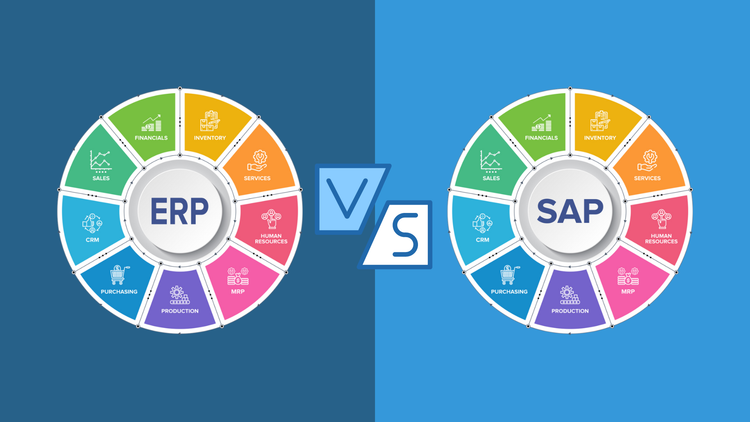The Difference Between ERP and SAP
When researching business software, it’s common to see the terms “ERP” and “SAP” used a lot. While they might seem interchangeable, understanding the differences between each term is crucial. ERP is a category of business management software, while SAP is a software company that develops and sells various ERP software.
Learn more about the differences of each and why it is important to not confuse the two acronyms when researching software below.

What is ERP?
ERP stands for enterprise resource planning software. ERP is a suite of business tools that usually range from financials to sales and related operations. ERP software was originally developed to automate manufacturing operations; however, it is now an all-in-one software for any type of business. The typical modules included in ERP programs are:
- Accounting
- Budgeting and forecasting
- Customer relationship management
- Human resources
- Inventory and supply chain management
These solutions can either be implemented straight out-of-the-box or undergo customization to include more modules. ERP can also integrate with third-party software to cover even more business functions.
What is SAP?
SAP is one of many ERP software developers on the market. SAP stands for Systems, Applications, and Products in Data Processing. The company, which originated in Germany in the 1970s, has grown to become one of the largest software vendors in the world. Their first software products were related to financial accounting, although even then they were focused on centralizing data storage for easier access and organization. The first product, which resembled an ERP, was R/2, released in 1992.
The Evolution of SAP in Modern ERP
SAP has come a long way from its early days as a financial accounting provider. Over time, it expanded its products into full-scale ERP systems, developing platforms that support finance, supply chain, HR, and more. Today, solutions like SAP S/4HANA Cloud and SAP Business One and new programs like RISE with SAP reflect the company’s push towards modular, cloud-based deployment.
Often, when someone says “SAP”, they’re referring to one of the company’s modern ERP products such as:
- SAP Business One
- SAP S/4HANA
- Business ByDesign
- SAP ECC (End of Life)
Key Differences
| ERP | SAP |
|---|---|
| ERP refers to a wide range of business software designed to optimize back office functions | SAP is a company that develops software, including ERP solutions |
| The ERP initialism stands for “Enterprise Resource Planning” | The SAP initialism stands for “System Analysis Program Development” or “Systemanalyse Programmentwicklung” in the original German |
| The first ERP systems can be traced to the 1960s, although the term wasn’t coined until the 1990s | The SAP company was founded in 1972 by 5 former IBM technology engineers |
| ERP can serve businesses of all sizes across every industry | SAP ERP solutions primarily serve medium to enterprise corporations |
| Some smaller ERPs are less resource-intensive | SAP ERP solutions demand more resources and investment |
Why is SAP Mistaken for ERP?
Because SAP is so well known for creating ERP software, the brand name is often used synonymously with the term “ERP.” This usually happens when someone has only ever used a SAP solution — similar to how people might say “Kleenex” instead of “tissue.” Over time, that familiarity leads to the misconception that SAP is ERP, rather than just one vendor that makes ERP software.
While common, this confusion can be limiting. Businesses researching ERP solutions should understand that SAP is just one of many options. Depending on your goals, there may be other ERP systems worth considering.
Other ERP Systems
While SAP is one of the best-known names in ERP, many other platforms are available, each with different strengths, pricing models, and target markets. Depending on your business size, industry, and goals, one of the following ERPs might be a better option:
- Oracle NetSuite - A leading cloud ERP designed for growing and enterprise-level businesses.
- Microsoft Dynamics 365 Business Central - Combines ERP and CRM capabilities with deep integration into Microsoft tools.
- Acumatica - A cloud-based ERP with flexible deployment, strong mobile access, and consumption-based pricing.
- Odoo - An open-source ERP with modular design, ideal for small businesses and startups.
- Epicor Kinetic - An ERP tailored for manufacturers and industrial companies with complex operations.
Each of these platforms can serve as a modern ERP and offer a comparable experience to SAP ERP systems.
